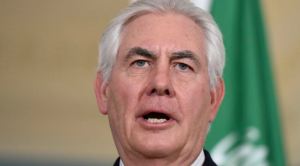nsnbc : The U.S. State Department noted that it is deeply disappointed by Kurdistan over its independence referendum on September 25 but that its relations with the Kurdish people will not change. The U.S. is concerned the referendum and related disputes will weaken the alliance against ISIS.
People in the Kurdistan Autonomous Region (KAR) of Iraq plus other territories currently under Kurdish administration turned out in high numbers in the historic and controversial referendum. As of Tuesday morning the votes are still being counted by the High Elections and Referendum Commission. However, voter turnout appears to have been high and it is expected that the result will be a yes vote backed by an overwhelming majority.
The vote took place despite unprecedented and coordinated pressure against the Kurdistan Regional Government by actors such as the federal government in Baghdad, Turkey, Iran, prominent Shiite politicians with ties to the Iran-backed Hashd al-Shaabi militants, among others.
The Iraqi parliament voted on Monday committing the Iraqi Prime Minister Haider al-Abadi to deploy troops to the areas that came under the control of the Kurdish forces after the US-led invasion of Iraq in 2003. This includes, in particular, the oil and gas-rich Kirkuk.
The United States had endorsed the referendum – in principle – but criticized the Kurdistan Regional Government for not having postponed the vote. The US argument, echoed by most EU members, was that the referendum would create discord and threaten cooperation in the fight against ISIS. However, following the referendum and while votes are still being counted, the U.S. State Department states “The United States opposes violence and unilateral moves by any party to alter boundaries.”
The Kurdish officials, including President Masoud Barzani and Prime Minister Nechirvan Barzani insist that the referendum is not to redraw borders. They say such issues, among others, are open for negotiations with Baghdad. Many independent observers would note that regions like Kirkuk might be viewed as a bargaining chip in talks with Baghdad.
President Masoud Barzani said for example that the Kurdistan Regional Government (KRG) would respect the decision of the people in Kirkuk. However, he also repeatedly said the KRG would never agree to negotiate the so-called Green Line that used to separate the Kurdish Peshmerga and the former Iraqi regime before the invasion, meaning that Kurdish forces will not withdraw to pre-2003 borders.
The Statement attributed to the spokesmen of the State Department read Monday that the September 25 vote “will increase instability and hardships for the Kurdistan region and its people.,” and that it will “greatly complicate” the relationship of the Kurdish government with Iraq, and its neighbors. “The United States’ historic relationship with the people of the Iraqi Kurdistan Region will not change in light of today’s non-binding referendum,” it continued.
F/AK – nsnbc 26.09.2017
Source Article from https://nsnbc.me/2017/09/26/u-s-disappointed-by-kurdistan-referendum-but-relations-will-not-change/
Related posts:
Views: 0
 RSS Feed
RSS Feed

















 September 26th, 2017
September 26th, 2017  Awake Goy
Awake Goy 












 Posted in
Posted in  Tags:
Tags: 
















